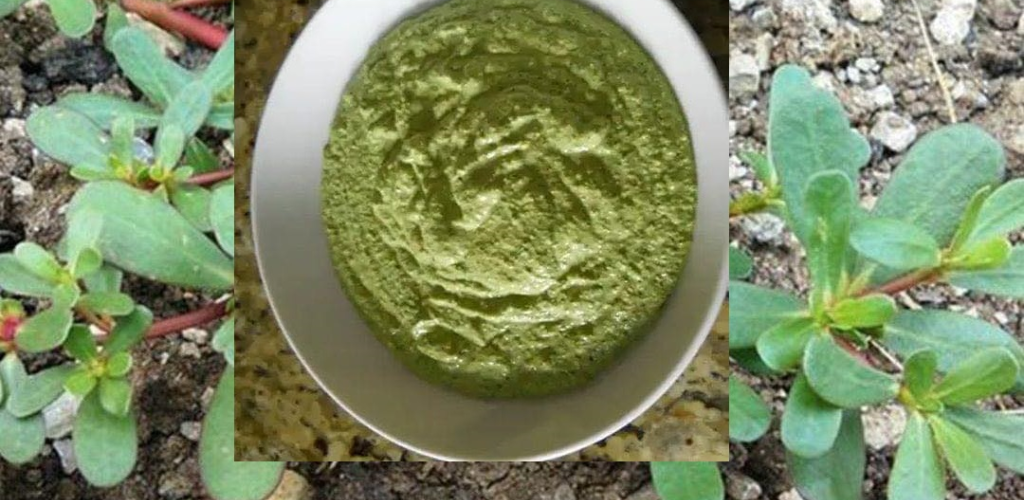Purslane is an underrated plant that is full of surprising benefits
Purslane, also known as Portulaca oleracea, is often considered a weed that grows in our gardens. However, it is a plant with multiple health benefits, used for centuries in traditional medicine. Rich in essential nutrients, purslane is not only delicious, but it also provides a multitude of health benefits. In this article, we will explore 10 benefits of purslane, as well as a simple recipe to incorporate it into your daily diet.
The 10 benefits of purslane
- Rich in Omega-3
Purslane is one of the few plants that is extremely rich in omega-3 fatty acids, essential fatty acids often associated with oily fish. These healthy fats are good for your heart and help reduce inflammation in your body, helping to prevent cardiovascular disease. - Source of Vitamins and Minerals
Purslane is an excellent source of vitamins A, C, and E, as well as minerals such as magnesium, calcium, and potassium. Vitamin A, for example, is essential for healthy skin and eyes, while potassium helps regulate blood pressure. - Antioxidant Properties
Purslane contains antioxidants, including vitamins C and E, which help protect cells from free radical damage. These antioxidants play a vital role in preventing premature aging and chronic diseases such as cancer.
- Supports Cardiovascular Health
Thanks to its high potassium and omega-3 content, purslane is good for your heart. Potassium helps maintain normal blood pressure, while omega-3s help lower cholesterol levels, thereby reducing the risk of cardiovascular disease. - Aids in Weight Loss
Purslane is very low in calories while being high in dietary fiber. This makes it an ideal food for those looking to lose weight. Fiber helps provide a lasting feeling of fullness, reducing the desire to snack between meals.
- Anti-inflammatory Effect
The omega-3 fatty acids and antioxidants found in purslane help reduce inflammation in the body. This can be especially beneficial for those suffering from chronic inflammation, such as arthritis. - Improves Digestive Health
Purslane is rich in mucilage, a substance that helps soothe the digestive system and prevent disorders such as constipation. It acts as a prebiotic, promoting healthy intestinal flora. - Reduced Risk of Diabetes
Studies have shown that purslane may help regulate blood sugar levels. Regular consumption may be beneficial for those at risk of developing type 2 diabetes or those who want to better control their blood sugar levels. - Antibacterial Properties
Purslane also has antibacterial properties that can help fight certain infections. These properties are particularly effective in wound healing and preventing skin infections. - Improves Eye Health
Thanks to its vitamin A and beta-carotene content, purslane contributes to eye health. These nutrients are essential for preventing macular degeneration and cataracts, two common age-related vision problems.
Simple Recipe for Using Purslane: Purslane Salad
Purslane can be eaten raw or cooked, but one of the easiest and tastiest ways to eat it is in a salad. Here is an easy recipe to enjoy its benefits while enjoying yourself.
Ingredients:
1 handful of purslane leaves (washed and drained)
2 ripe tomatoes
1 cucumber
1 red onion
2 tablespoons of extra virgin olive oil
Juice of half a lemon
Salt and pepper to taste
A handful of crumbled feta (optional)
Instructions:
Ingredient preparation: Wash the purslane leaves well and drain them. Cut the tomatoes and cucumber into slices, and finely slice the red onion.
Salad assembly: In a large salad bowl, mix the purslane leaves with the tomato, cucumber and onion slices.
Seasoning: Drizzle the salad with olive oil and lemon juice. Season with salt and pepper to taste.
Adding the feta: If you like cheese, you can add a handful of crumbled feta for extra flavor and creaminess.
Mix and serve: Gently mix all the ingredients to distribute the seasoning evenly. Serve immediately to enjoy the
